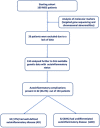Somatic Mutations and the Risk of Undifferentiated Autoinflammatory Disease in MDS: An Under-Recognized but Prognostically Important Complication
- PMID: 33679746
- PMCID: PMC7933213
- DOI: 10.3389/fimmu.2021.610019
Somatic Mutations and the Risk of Undifferentiated Autoinflammatory Disease in MDS: An Under-Recognized but Prognostically Important Complication
Abstract
Objectives: We theorized that myelodysplastic syndrome (MDS) with somatic mutations and karyotype abnormalities are associated with autoinflammation, and that the presence of autoinflammatory disease affected prognosis in MDS. Methods: One hundred thirty-four MDS patients were assessed for the prevalence of autoinflammatory complications and its link with karyotypes and somatic mutation status. Autoinflammatory complications were described either as well-defined autoinflammatory diseases (AD) or undifferentiated "autoinflammatory disease" (UAD) (defined as CRP over 10.0 mg/L on five consecutive occasions, taken at separate times and not explained by infection). Several patient characteristics including demographic, clinical, laboratory, cytogenetics charts, and outcomes, were compared between different groups. Results: Sixty-two (46.3%) patients had an autoinflammatory complication manifesting as arthralgia (43.5% vs. 23.6%, p = 0.0146), arthritis (30.6% vs. 15.3%, p = 0.0340), skin rash (27.4% vs. 12.5%, p = 0.0301), pleuritis (14.5% vs. 4.2%, p = 0.0371) and unexplained fever (27.4% vs. 0%, p < 0.0001). AD were found in 7.4% of MDS patients (with polymyalgia rheumatic being the most frequently one). Classical autoimmune diseases were found only in 4 MDS patients (3.0%). Transcription factor pathway mutations (RUNX1, BCOR, WTI, TP53) (OR 2.20 [95%CI 1.02-4.75], p = 0.0451) and abnormal karyotypes (OR 2.76 [95%CI 1.22-6.26], p = 0.0153) were associated with autoinflammatory complications. Acute leukaemic transformation was more frequent in MDS patients with autoinflammatory features than those without (27.4% vs. 9.7%, p = 0.0080). Conclusions: Autoinflammatory complications are common in MDS. Somatic mutations of transcription factor pathways and abnormal karyotypes are associated with greater risk of autoinflammatory complications, which are themselves linked to malignant transformation and a worse prognosis.
Keywords: autoinflammation; molecular characterization; myelodysplatic syndrome; somatic mutations; undifferentiated autoinflammatory disease.
Copyright © 2021 Watad, Kacar, Bragazzi, Zhou, Jassam, Taylor, Roman, Smith, Jones, Amital, Cargo, McGonagle and Savic.
Conflict of interest statement
SS declares that he has received a travel grant and honoraria from SOBI and Novartis. The remaining authors declare that the research was conducted in the absence of any commercial or financial relationships that could be construed as a potential conflict of interest.
Figures


References
Publication types
MeSH terms
Substances
Grants and funding
LinkOut - more resources
Full Text Sources
Other Literature Sources
Medical
Research Materials
Miscellaneous

